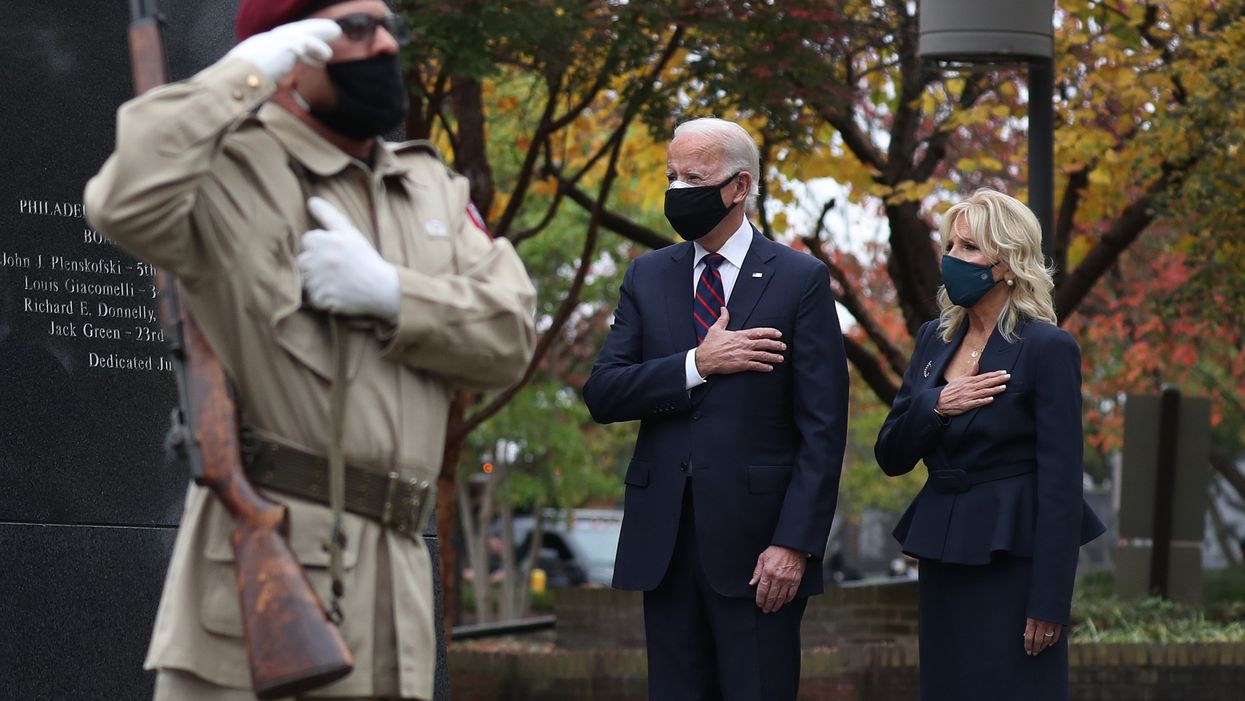Joe Biden has plenty of campaign promises to keep, beyond the obvious and enormous top priorities of corralling the coronavirus and stabilizing the economy. And that's made democracy reform groups, which have never counted him as an impassioned ally, newly skeptical their priorities will get addressed in his new administration.
Their anxiety has come to the surface this week. A coalition of 170 progressive good governance and voting rights organizations asked the president-elect to elevate a collection of fix-the-system proposals into his first 100 days' agenda. Separately, one of the most influential such groups, RepresentUs, lambasted the Biden transition for "an omission of epic proportions" by giving short shrift to the issues it cares about.
Their impatience, just days after Biden's victory became clear, underscores the precarious position the cause of fixing democracy's dysfunction has in the public policy agenda.
At the same time, however, Speaker Nancy Pelosi has signaled she may revive the sweeping election process, government ethics and money-in politics legislation known as HR 1, and have the House pass it again in January even before Biden's inauguration.
Doing so "right off the bat," she told reporters before her Democratic majority was trimmed by about a dozen seats on Election Day, would "reduce the role of big, dark, special-interest money that prevents us from having policies that the American people need."
That could only happen, though, if the Democrats win both runoffs in Georgia in January and take the narrowest possible control of the Senate. Otherwise, HR 1 and all the other legislation on the good governance wish list — including a restoration of the Voting Rights Act and a package to curb executive power abuses — would continue to get ignored to death by GOP Majority Leader Mitch McConnell.
Biden has backed taxpayer funding of congressional and presidential campaigns — a Holy Grail for many reform groups — since he was a new Delaware senator in the 1970s. And early in his campaign for the Democratic nomination he unveiled a full slate of proposals for expanding voting rights, curbing money's sway over campaigns, bolstering government ethics and recalibrating the balance of power.
But, unlike seven of his rivals in the sprawling early field, in the summer of 2019 he declined to sign a pledge to put those issues on top of his legislative agenda if elected. And, after he wrapped up the nomination, it appeared to take a concerted lobbying effort to get a robust section on democracy reform added to the party platform — just in time for a convention when almost all mentions of the topic were about the need to assure easy voting in the pandemic-upended election.
Part of that effort was a public appeal to Biden from a new coalition dubbing itself the Declaration for American Democracy.
It was that group that went public Tuesday with a manifesto calling on Biden to both push hard for HR 1, whether Congress stays divided or not, but also make 30 different moves by executive order to promote voting rights and assure his administration is more honest, transparent, responsive and respectful of checks and balances than in the past.
The most important moves on the coalition's list, it said, would be requiring federal social services agencies to help the people they serve register to vote; tightening the ethics pledge for political appointees; curbing the revolving door between the executive branch and lobbyist and corporate offices; refusing to have anything to do with fundraising by so-called super PACS; posting White House visitor logs; and making public all the work of the White House office of legal counsel.
For the organizations in the group, any of these changes would represent a dramatic shift from the past four years. President Trump, who won partly on a vow to "drain the swamp," has done nothing of the kind while upending virtually avery norm of democracy he could get his hands on.
Most recently, and potentially most consequentially, has been his decision to contest his defeat last week and in the meantime refuse to cooperate in the transition. But along the way he has challenged the precepts of open and ethical government by commingling his business interests with government work, choosing secrecy over transparency at nearly every turn and thwarting all congressional efforts to oversee or investigate his activities.
But there is no time to wait, said Josh Silver, who runs the influential reform group RepresentUs. And the signals from the Biden transition team that such issues have fallen to the second tier demonstrate "an omission of epic proportions."
It "follows a pattern of Democratic presidential candidates talking big about these issues on the campaign trail and promptly ignoring them when the chips are down. That's why our nation is in the perilous position we're in now," he said in an exceptionally harsh statement Monday. "It just requires leadership that prioritizes these reforms. Based on President-elect Biden's Day 1 agenda, it's not going to happen, and he is guaranteeing more dysfunction, more authoritarianism and more instability."
Biden will likely focus first on proposals that could attract bipartisan support — starting with providing economic relief during the resurgent pandemic and then moving on to improving the nation's crumbling infrastructure and using the climate change crisis as the basis for job creation.
The political dynamic on Capitol Hill means Biden may have to pull back from some policy proposals that are mainly goals of the left and have little or no traction among conservatives. Democracy reform, in the main, falls in that bucket




















Trump & Hegseth gave Mark Kelly a huge 2028 gift